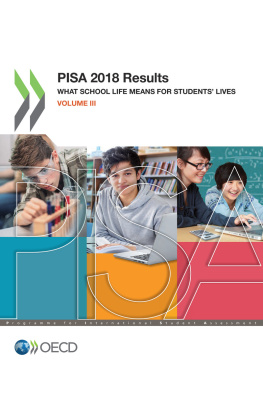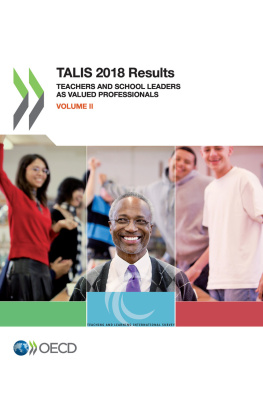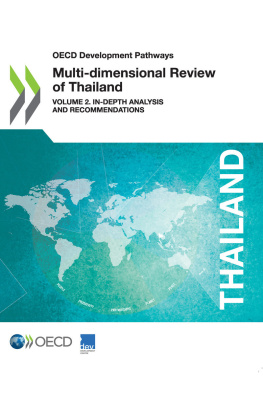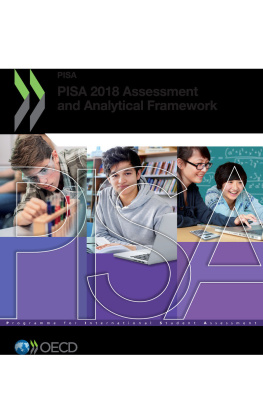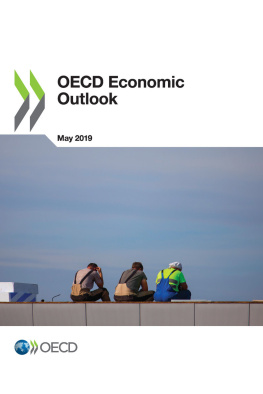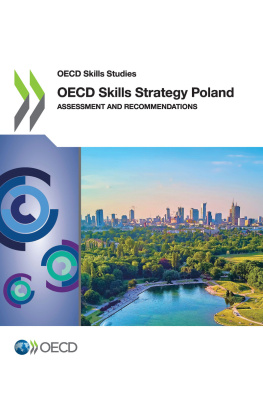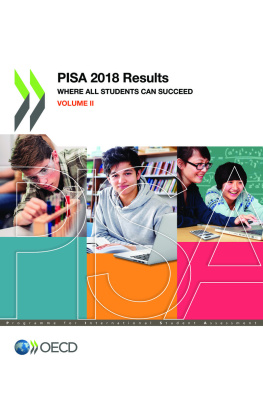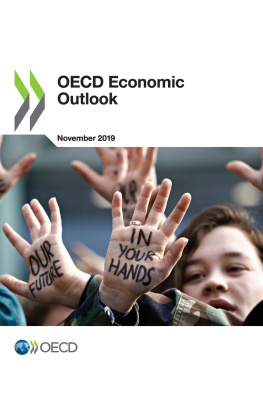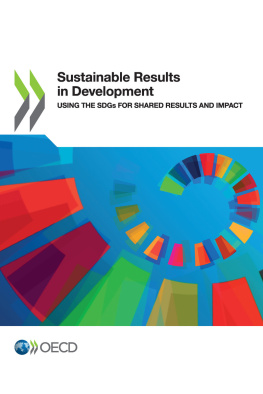OECD - PISA 2018 Results (Volume 3)
Here you can read online OECD - PISA 2018 Results (Volume 3) full text of the book (entire story) in english for free. Download pdf and epub, get meaning, cover and reviews about this ebook. year: 2019, publisher: OECD Publishing, genre: Politics. Description of the work, (preface) as well as reviews are available. Best literature library LitArk.com created for fans of good reading and offers a wide selection of genres:
Romance novel
Science fiction
Adventure
Detective
Science
History
Home and family
Prose
Art
Politics
Computer
Non-fiction
Religion
Business
Children
Humor
Choose a favorite category and find really read worthwhile books. Enjoy immersion in the world of imagination, feel the emotions of the characters or learn something new for yourself, make an fascinating discovery.
PISA 2018 Results (Volume 3): summary, description and annotation
We offer to read an annotation, description, summary or preface (depends on what the author of the book "PISA 2018 Results (Volume 3)" wrote himself). If you haven't found the necessary information about the book — write in the comments, we will try to find it.
OECD: author's other books
Who wrote PISA 2018 Results (Volume 3)? Find out the surname, the name of the author of the book and a list of all author's works by series.
PISA 2018 Results (Volume 3) — read online for free the complete book (whole text) full work
Below is the text of the book, divided by pages. System saving the place of the last page read, allows you to conveniently read the book "PISA 2018 Results (Volume 3)" online for free, without having to search again every time where you left off. Put a bookmark, and you can go to the page where you finished reading at any time.
Font size:
Interval:
Bookmark:
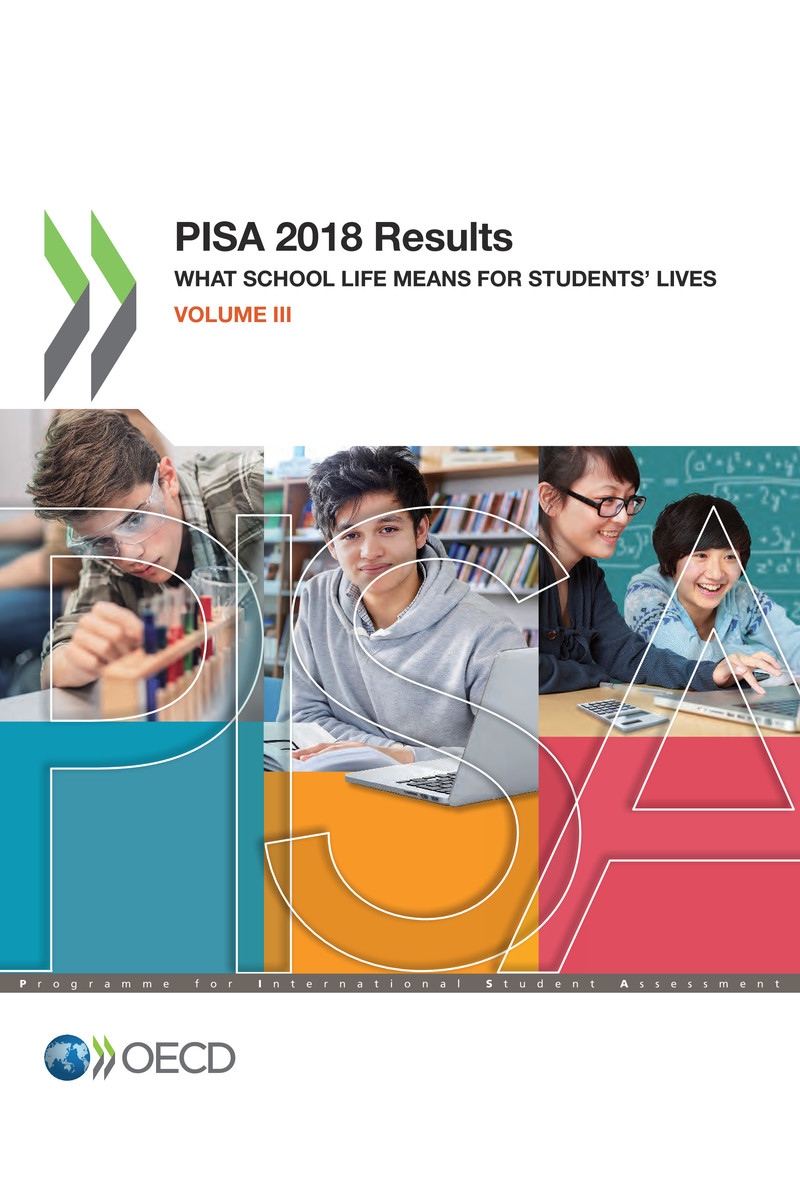
OECD (2019), PISA 2018 Results (Volume III): What School Life Means for Students Lives , PISA, OECD Publishing, Paris, https://doi.org/10.1787/acd78851-en .
The information in this document with reference to Cyprus relates to the southern part of the Island. There is no single authority representing both Turkish and Greek Cypriot people on the Island. Turkey recognises the Turkish Republic of Northern Cyprus (TRNC). Until a lasting and equitable solution is found within the context of the United Nations, Turkey shall preserve its position concerning the Cyprus issue.
The Republic of Cyprus is recognised by all members of the United Nations with the exception of Turkey. The information in this document relates to the area under the effective control of the Government of the Republic of Cyprus.
Among its many findings, our PISA 2018 assessment shows that 15-year-old students in the four provinces/municipalities of China that participated in the study Beijing, Shanghai, Jiangsu and Zhejiang outperformed by a large margin their peers from all of the other 78 participating education systems, in mathematics and science. Moreover, the 10 % most disadvantaged students in these four jurisdictions also showed better reading skills than those of the average student in OECD countries, as well as skills similar to the 10 % most advantaged students in some of these countries. True, these four provinces/municipalities in eastern China are far from representing China as a whole, but the size of each of them compares to that of a typical OECD country, and their combined populations amount to over 180 million. What makes their achievement even more remarkable is that the level of income of these four Chinese regions is well below the OECD average. The quality of their schools today will feed into the strength of their economies tomorrow.
In this context, and given the fact that expenditure per primary and secondary student rose by more than 15 % across OECD countries over the past decade, it is disappointing that most OECD countries saw virtually no improvement in the performance of their students since PISA was first conducted in 2000. In fact, only seven of the 79 education systems analysed saw significant improvements in the reading, mathematics and science performance of their students throughout their participation in PISA, and only one of these, Portugal, is a member of the OECD.
During the same period, the demands placed on the reading skills of 15-year-olds have fundamentally changed. The smartphone has transformed the ways in which people read and exchange information; and digitalisation has resulted in the emergence of new forms of text, ranging from the concise, to the lengthy and unwieldy. In the past, students could find clear and singular answers to their questions in carefully curated and government-approved textbooks, and they could trust those answers to be true. Today, they will find hundreds of thousands of answers to their questions on line, and it is up to them to figure out what is true and what is false, what is right and what is wrong. Reading is no longer mainly about extracting information; it is about constructing knowledge, thinking critically and making well-founded judgements. Against this backdrop, the findings from this latest PISA round show that fewer than 1 in 10 students in OECD countries was able to distinguish between fact and opinion, based on implicit cues pertaining to the content or source of the information. In fact, only in the four provinces/municipalities of China, as well as in Canada, Estonia, Finland, Singapore and the United States, did more than one in seven students demonstrate this level of reading proficiency.
There is another side to this. The kinds of things that are easy to teach are nowadays also easy to digitise and automate. In the age of artificial intelligence (AI) we need to think harder about how to develop first-class humans, and how we can pair the AI of computers with the cognitive, social and emotional skills, and values of people. AI will amplify good ideas and good practice in the same way as it amplifies bad ideas and bad practice it is ethically neutral. However, AI is always in the hands of people who are not neutral. That is why education in the future is not just about teaching people, but also about helping them develop a reliable compass to navigate an increasingly complex, ambiguous and volatile world. Whether AI will destroy or create more jobs will very much depend on whether our imagination, our awareness, and our sense of responsibility will help us harness technology to shape the world for the better. These are issues that the OECD is currently exploring with our Education 2030 project.
PISA is also broadening the range of outcomes that it measures, including global competency in 2018, creative thinking in 2021, and learning in the digital world in 2024. The 2018 assessment asked students to express how they relate to others, what they think of their lives and their future, and whether they believe they have the capacity to grow and improve.
Measuring the well-being of 15-year-old students, the target PISA population, is particularly important, as students at this age are in a key transition phase of physical and emotional development. When it comes to those social and emotional outcomes, the top-performing Chinese provinces/municipalities are among the education systems with most room for improvement.
Even across OECD countries, just about two in three students reported that they are satisfied with their lives, and that percentage shrank by five percentage points between 2015 and 2018. Some 6 % of students reported always feeling sad. In almost every education system, girls expressed greater fear of failure than boys, even when they outperformed boys in reading by a large margin. Almost a quarter of students reported being bullied at least a few times a month. Perhaps most disturbingly, in one-third of countries and economies that participated in PISA 2018, including OECD countries such as Greece, Mexico and Poland, more than one in two students said that intelligence was something about them that they couldnt change very much. Those students are unlikely to make the investments in themselves that are necessary to succeed in school and in life. Importantly, having a growth mindset seems consistently associated with students motivation to master tasks, general self-efficacy, setting learning goals and perceiving the value of school, and negatively associated with their fear of failure. Even if the well-being indicators examined by PISA do not refer specifically to the school context, students who sat the 2018 PISA test cited three main aspects of their lives that influence how they feel: life at school, their relationships with their parents, and how satisfied they are with the way they look.
Font size:
Interval:
Bookmark:
Similar books «PISA 2018 Results (Volume 3)»
Look at similar books to PISA 2018 Results (Volume 3). We have selected literature similar in name and meaning in the hope of providing readers with more options to find new, interesting, not yet read works.
Discussion, reviews of the book PISA 2018 Results (Volume 3) and just readers' own opinions. Leave your comments, write what you think about the work, its meaning or the main characters. Specify what exactly you liked and what you didn't like, and why you think so.

